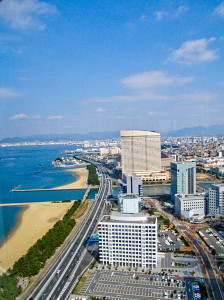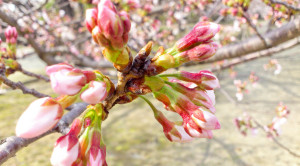First of all, my plans for 2015
Before I start posting about my Japanese adventure with Usagi-san, I need to explain a bit more about what my life in the next two years is going to look like if everything goes as planned. So here they are, My plans for 2015.
Prior to my real adventure, I’ll finish my school year at university which ends in June. Then there’s about a month left for preparations before I travel to Fukuoka, which is the biggest city of on the island of Kyushu. This is the centre of my adventure. Why Fukuoka? Because to me, it’s a perfect mix of a big, modern city and traditional Japanese culture. Maybe I’ll introduce Fukuoka and my love for this city in a later post.
My plan, so far…. Studying Japanese

So, early August I’ll arrive in Fukuoka, on a tourism visa valid for three months. There I’ll take Japanese classes for two months at Genki Japanese and Culture School, or GenkiJACS for short. They’ll help me with my student visa application, since the process is really complicated. There’s a lot of paperwork involved and you must meet certain conditions. But if all goes well, I’ll get my student visa after two months and officially be an alien resident in Japan –whoo, I’ll get a official Japanese ID-card.
When I’m there
In October I’ll start at Fukuoka YMCA, a Japanese language school with a totally different atmosphere; at GenkiJACS the students are a mix of western nationalities, while at YMCA most are from Asia. One thing is for certain, I will have a huge disadvantages when it comes to kanji.
Both GenkiJACS and YMCA provide a dormitory for students. I’m not going to stay with a host family, I’ve done that before. It was a great experience, but for now I need to keep the cost limited so this time it’s not an option.

During these 14 months I’ll have classes every weekday for four hours. In between I’d like to go to a lot of places in Fukuoka and the cities around. When I have holidays I hope to visit more distant places. I’m glad to be able to witness all four seasons, with all their good and bad sides. And tons of festivals, each with their own special meaning.
Before I leave
But before all of this is happens, there’s still a lot I need to do. I need to book my flight and go through a lot of administration in Belgium, such as making sure my health insurance is in order and make sure my bank card doesn’t expire while in Japan. And maybe the most important thing before I leave is the financial part, because –let’s face it– this trip will cost a lot. Even if I’m going to try finding a job there once I get my student visa, I still need to get a huge amount together to finance this.
At the moment I’m starting to work out some kind of crowdfunding project. The ideas are coming but it is still early. I hope to tell everyone more about this next month, around the middle of February.
So…..
This is a short summary on what my big world plans are for 2015. If you have nice ideas for my blog you want to see,crowdfunding, or other remarks, go ahead and post them in the comments.
Hi Karolien! I’m also going to Fukuoka this year. The only difference is I’ll arrive to GenkiJACS in October and stay through March when I hope to enter the YMCA in April. It’s exciting to find someone who will be there around the same time as I. And I completely agree with you regarding the cost. Trying to figure out how to fund it feels overwhelming sometimes. Plus all the little things we have to get done before we leave. Can I ask which of the Fukuoka YMCAs you intend to enter?
Hi Ariel, Nice to hear that you’re also going to Fukuoka. I’m planning to enter the YMCA in Tenjin. Because I do not have the intention to enter a university in Japan. I hope that after that one year, at YMCA (or maybe 1,5- 2 year) I can go for my JLPT test level three or maybe level two. If you arrive in October I will probably see you at GenkiJACS. Which of the Fukuoka YMCAs are you going to enter? I hope your preparation are going fine and you will figure out how to fund this big adventure.
hi i found your comments because i am researching and thinking about going to ymca fukuoka. what was your results? did you learn alot? can you speak fluent now because of the school? which ymca did you study at? thanks
I did learn a lot but it was also because of the combination of living in Japan and looking for Japanese encounters, like going to Japanese only parties. I went to the YMCA in Tenjin. That one focus just one people who want to prepare for JLPT and daily life. The other YMCA is when you want to go to Japanese university, you will get extra classes there with vocab that you need in a school context.
The school in itself was Ok. It’s a Japanese way a studying, so do not expect to much creative ways of teaching, and prepare for a lot of just hard core remembering. They are friendly but are not really used to a lot of westerns. So a lot of the support and activities are for the other Asian students. Depending on the level you start with, YMCA can be a blessing or a curse. I started with a low intermediate level and found it interesting. But if you are a beginner it can be difficult. There is no English support. They speak a bit English but from day 1 they explain everything in Japanese and they want you to ask everything in Japanese. If you take the challenge it is a good way to learn but it can also be a bit frustrated that you do not have a English way to confirm you understand it correct. (Depending if there is a other western student that maybe helps you out).
I stayed there for 1,5 year. at the end I was in the B class what you can compare with JLPT 2 (but I did not take the test). I can have fluent daily conversations, I can read daily messages in the street. and I can read around 1200 kanji. I can improvise good and can keep the conversation fluent. But that is I think the strong point of western student. We are good talkers. The Asian student have other advantages, Like the Koreans have a lot of vocab because there are a lot of similarities. The Taiwanese have a lot of kanji knowledge. So depending on how the class is 1 or an other aspect can go a bit to fast because they dominate the level of your class.
I had a great time in YMCA, I was not the best and easiest student they have, but it was a nice environment that forced me to use my Japanese. They also give support on looking for a job and possible a work visum, but like a lot they are not so tuned in with western expectations, but they learn. If you are more of a beginner and are maybe a bit hesitant to go to YMCA now I said all this. Maybe you already know but there is also GenkiJACS. this school located in Fukuoka and Tokyo also give 1 year student visum but they are much more western orientated. They also want you to be in at a low beginner level.
If you have more questions don’t be hesitant to ask. I will try to answer them. ^^
hi i found your comments because i am researching and thinking about going to ymca fukuoka. what was your results? did you learn alot? can you speak fluent now because of the school? which ymca did you study at? thanks
I don’t have any plans to continue on to a Japanese university either, so I had been thinking of Tenjin, but since my ultimate goal is to try to become a translator, I’m thinking that Nanakuma school would be better for that with their emphasis on kanji. In the end though, I’ll postpone my decision till I’m there so I can have a chance to speak with the schools and teachers and see what would work best. It’s fun to talk with someone who is also preparing to go.
Right now I’m saving and trying to look for scholarships to fund the trip. I look forward to seeing any ideas you come up with, and if I find any viable tips, I’ll be sure to share!
Becoming a translator sounds hard, but 頑張って、Go for your dream. Their emphasis on kanji is a nice extra point. But if you got the hang for kanji, you can study them pretty easily by yourself. I’m not sure how both schools are different in level and speed. The reason I choose Tenjin is also because I want to increase my fluency in daily conversation. I have a basic level of grammar, but I’m really stuck at the moment because I’m such a person that learns more from real life situations then classes. And although I like kanji, I’m not so great in it, -teachers always complain about my balance :P- But you’re going to stay 6 months in GenkiJacs so you have plenty of time to compare.